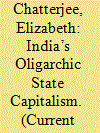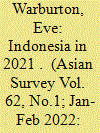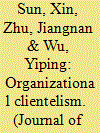|
|
|
Sort Order |
|
|
|
Items / Page
|
|
|
|
|
|
|
| Srl | Item |
| 1 |
ID:
189712


|
|
|
|
|
| Summary/Abstract |
Almost nine years into Narendra Modi’s premiership, there is little sign of an ideological commitment to the free market at the apex of the Indian state. Instead, this article characterizes India’s developmental model as a form of state capitalism, structured by the government’s direct influence on economic relationships. The Modi government took office in the midst of a legitimacy crisis generated by the state-dominated financial system. In response, it has fostered an increasingly oligarchic state capitalism, aiming to mobilize private resources through a narrow alliance of state and business interests. This strategy entails serious economic distortions and political risks.
|
|
|
|
|
|
|
|
|
|
|
|
|
|
|
|
| 2 |
ID:
185204


|
|
|
|
|
| Summary/Abstract |
A devastating wave of COVID-19 infections cast a long shadow over all political and economic developments in Indonesia in 2021. Many of the patterns and trends identified in this journal’s previous year-end analysis intensified in 2021, with a deepening of pandemic-induced crises, immense loss of life, and further erosion of democratic norms and institutions, including unprecedented intervention into a corruption watchdog and a major business association. The administration of president Joko Widodo has focused almost exclusively on economic development and business investment throughout the pandemic; but the spread of the Delta strain forced a shift in the government’s approach to lockdowns, prompting new concerns about rising poverty and inequality.
|
|
|
|
|
|
|
|
|
|
|
|
|
|
|
|
| 3 |
ID:
161559


|
|
|
|
|
| Summary/Abstract |
Existing theories on real exchange rates predict a significant undervaluation of the Korean won (KRW) in the early and mid-1990s. The paper demonstrates why this expectation did not materialize and instead an unprecedentedly large degree of overvaluation took place. Focusing on three variables, namely, financial repression, devaluation pass-through, and policy exhibitionism, the paper examines how the unraveling of the developmental state eventually gave rise to the 1990s’ overvaluation. It argues that the policy exhibitionism of the new civilian government amplified the influence of Chaebol on monetary policies, which in turn created a strong appreciative force to KRW. It also contends that the increasing exchange rate pass-through onto the prices of imported intermediate goods explains why Chaebol did not desire to tame the excessive appreciative trend despite its detrimental effect on their exports. The paper offers policy implications for other state-led, emerging economies.
|
|
|
|
|
|
|
|
|
|
|
|
|
|
|
|
| 4 |
ID:
128940


|
|
|
|
|
| Publication |
2014.
|
| Summary/Abstract |
Extant literature on authoritarian legislatures argues that dictators set up quasi-democratic institutions to co-opt opposition and attract investors. We argue that dictators also nurture clientelistic ties with social groups useful to their rule, a previously overlooked function of authoritarian legislatures. Drawing on the case of Chinese local legislatures-namely, the local People's Congress and the local People's Political Consultative Conference-we find that Chinese local governments use these institutions to channel patronage to and gain political support from the private sector. Field interviews and an analysis of a nationwide firm-level survey show that private firms owned by local legislative members, while obtaining more bank loans, provide more support to the local government in various forms than those owned by nonmembers. This finding suggests that authoritarian legislatures, even those with weak policymaking efficacy, can help authoritarian states build stable alliances with social groups, thereby contributing to regime resilience.
|
|
|
|
|
|
|
|
|
|
|
|
|
|
|
|
| 5 |
ID:
192092


|
|
|
|
|
| Summary/Abstract |
This article offers a detailed analysis of the policy design of the current fourth round of state-owned enterprise (SOE) corporate restructuring in China. This time, the state’s efforts to improve SOE performance hinged on attracting private capital to take ownership shares in state firms—or so-called mixed-ownership reforms. The article relies on an analysis of policy documents, interviews with policy experts in China, and a case study of local mixed-ownership reform implementation in the city of Nanjing. It discusses implications of mixed ownership for corporate governance amid changing state–Party–business relations in China. It concludes that the reform agenda consolidates a hybrid political-economic system that organically blends planning and market modes of economic coordination, as well as public and private modes of ownership.
|
|
|
|
|
|
|
|
|
|
|
|
|
|
|
|
| 6 |
ID:
166120


|
|
|
|
|
| Summary/Abstract |
This paper aims to examine whether the industrial development of South Korea has been transformed from the state-led developmental model towards the new balanced model as anticipated by the government after the 1997 Asian financial crisis. The new role of the state would surely transform under the new development model. However, the academic debate on what has been changed and its effectiveness remains. Our main research question is: in the pursuit of social equity and balanced development, has the role of the Korean state as well as institutional arrangements shifted? What factors influence the outcomes and obstacles? In summary, the South Korea state altered its role to decentralize resources to various private actors and delegate regional government and local agents, such as technology parks, research institutions, and universities. This initiative aims to promote endogenous growth through a bottom- up approach. Particularly, the approach for financial funding and technology transfer were derived from the United States neo-liberal method, namely, Silicon Valley model. However, the outcomes deviated from those expected. We conclude that path-dependent factors, such as chaebol-monopolized industrial structure and political cronyism issues, hinder the intent of such transformation.
|
|
|
|
|
|
|
|
|
|
|
|
|
|
|
|
|
|
|
|
|